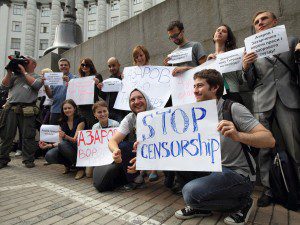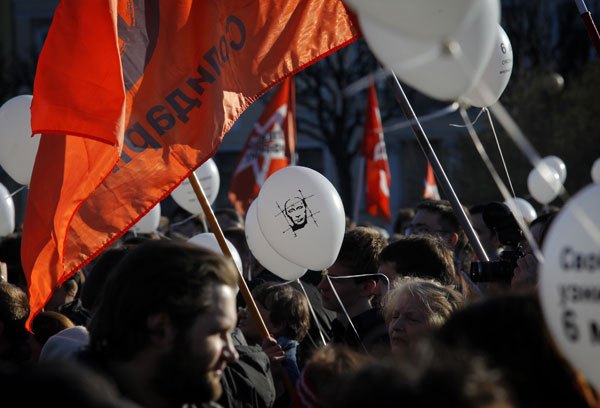UN extends mandate of Special Rapporteur on Belarus
A resolution that was adopted today in Geneva extends the mandate of Miklos Haraszti, a Special Rapporteur on human rights situation in Belarus, for one more year. Andrei Aliaksandrau reports
The UN Human Rights Council expressed its “deep concern at continuing violations of human rights in Belarus, which are of a structural and endemic nature, and also at the systemic and systematic restrictions on human rights, especially in the case of the freedoms of association, of assembly, and of opinion and expression, as well as the guarantees of due process and fair trial.”
The Council strongly urged the Belarusian government to “immediately and unconditionally release and rehabilitate all political prisoners, and to rehabilitate those who have already been released, to address, through comprehensive, transparent and credible investigations, reports of torture and ill-treatment by law-enforcement officials, and to put an immediate end to the arbitrary detention of human rights defenders and political opponents, arbitrary travel bans and other policies aimed at intimidating representatives of the political opposition and the media, as well as human rights defenders and civil society.”
Related: The first rule of dictator club…
The resolution extends the mandate of a Special Rapporteur on human rights situation in Belarus and urges the government of the country to cooperate fully with the Miklos Haraszti, including by providing him access to visit Belarus. Previously, he was denied a visa to enter the country, and it is likely still to be the case in future. Mikhail Khvostov, the Permanent Representative of Belarus to the UN Office in Geneva, reiterated just before the voting that Belarus does not recognize the mandate of the Special Rapporteur. He also described the resolution proposed by the European Union as an “act of aggression against the United Nations,” BelaPAN News Agency reported.
Twenty-six countries voted in favour of the resolution, while three countries voted against it and 18 more abstained. The attempts of delegations of several “like-minded” states to prevent a critical resolution on Belarus, failed.
“This is a significant resolution that allows keeping the alarming human rights situation in Belarus in focus of international community. I hope the authorities of the country change their aggressive attitude towards the Special Rapporteur and start cooperating with him to bring positive changes to the situation,” Tatsiana Raviaka, a representative of the Human Rights Centre “Viasna”, told Index.
Journalists defend colleagues in Ukraine’s ‘new war with press’
Two journalists were attacked while covering a street rally in Kiev, and nine more Ukrainian reporters were in danger of losing government accreditation following a protest to support their colleagues, Andrei Alaiksandrau reports.
TV journalist Olga Snitsarchuk and her husband, Kommersant photographer Vladislav Sodel were beaten on 18 May in the centre of Kiev, while they were taking pictures of a political rally in the Ukrainian capital. The journalists began recording images of a group of young men who were attacking people at the gathering.

Ukrainian journalists rally in Kiev to support journalists. (Photo: ukrafoto ukrainian news / Demotix)
“Having seeing that I started taking photos, young men in tracksuits rushed at me. And Olga began to take video of how they were beating me, so the men knocked her to the ground and began to beat”, Vladislav Sodel told Ukrainskaya Pravda.
Police officers who were present at the scene ignored appeals for help from rally participants and the journalists, according to witnesses. One of the attackers was later identified as Vadim Titushko, who happens to be a member of a police sports club. Titushko was detained and interrogated, but on 22 May released on bail.
Full Coverage: Ukraine | Today on Index: Brazil’s Federal Police seize journalist’s equipment | Birthday wishes for Bassel Khartabil | Vietnamese activists appeal sentences | Free expression in the news
Index on Censorship Events
Caught in the web: how free are we online? June 10, 2013
The internet: free open space, wild wild west, or totalitarian state? However you view the web, in today’s world it is bringing both opportunities and threats for free expression. More >>>
Ukrainian journalists demanded the incident be properly investigated. On 22 May nine reporters conducted a silent action during a government meeting by turning their backs on ministers to show posters that read “Today it is a journalist, tomorrow it is going to be your wife, sister or daughter. Take action!”
Prime Minister Mykola Azarov ordered the journalists removed from the hall and, later, withdrew their press credentials for “breach of order of coverage of Cabinet of Ministers’ work.” This incident prompted about 100 Ukrainian journalists to protest outside the prime minister’s office in support of Snitsarchuk, Sodel and their nine colleagues. The government announced that the journalists would keep their accreditation. Moreover, Verkhovna Rada, a member of Ukraine’s parliament, today created an ad-hoc committee to investigate the 18 May incident.
“We are at the beginning of a new war between the state and the press,” a Ukraininan MP and a former journalist Volodymyr Ariev said yesterday in London during a conference on media regulation, organised by Parliamentary Assembly of the Council of Europe.
The Institute of Mass Information, a Ukrainian media freedom non-governmental organisation, has reported on the deterioration of the media environment in the country.
“There was a huge increase in the number of physical attacks on journalists in 2012, with 80 cases registered in comparison to just 26 in 2011. We also note an increase of instances of censorship. This year is going to be tough for journalists and free speech in Ukraine as the authorities will definitely aim at building the basis for 2015 presidential elections,” Oksana Romaniuk, a representative of Reporters Without Borders in Ukraine, told Index.
Russian bird lovers targeted as ‘foreign agents’

Russian opposition supporters gathered on 6 May to protest against Vladimir Putin and demanded the release of political prisoners. Photo: Elena Ignatyeva / Demotix
An organisation behind a nature reserve dedicated to the protection of Russia’s cranes has been ordered to register as “a foreign agent” under the country’s non-governmental organisation law. The case highlights how arbitrary implementation is chilling free expression in the country, Andrei Aliaksandrau reports.
